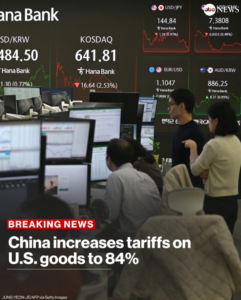In a significant escalation of global trade tensions, the European Union (EU) and China have announced substantial retaliatory measures in response to the United States’ recent tariff impositions under President Donald Trump.
European Union’s Response
On April 9, 2025, the EU approved retaliatory tariffs targeting $23 billion worth of U.S. goods. This decision follows the U.S.’s imposition of a 25% tariff on imported steel and aluminum from the EU, actions the EU deems unjustified and detrimental to both economies and global trade. The EU’s countermeasures are scheduled to be implemented in stages on April 15, May 15, and December 1, though specific products affected have not yet been disclosed. Despite these measures, the EU has expressed a preference for a negotiated and balanced settlement to resolve the dispute. AP News+3AP News+3New York Post+3
The EU’s retaliatory tariffs are part of a measured response to escalating trade tensions with Washington. The EU has also proposed a zero-tariff deal on industrial goods, including automobiles, but President Trump has deemed this offer insufficient. The EU’s approach aims to minimize economic fallout while encouraging dialogue. Bloomberg+2New York Post+2AP News+2AP News
China’s Retaliatory Measures
In response to the U.S.’s imposition of cumulative 104% tariffs on Chinese goods, China announced on April 9, 2025, that it would impose 84% tariffs on U.S. imports, effective immediately. This move is part of Beijing’s broader strategy to counter U.S. trade measures. Chinese officials have criticized the U.S. for its unilateral approach and have called for respectful and equal dialogue to resolve trade differences. Business Insider
Global Market Reactions
The escalation of trade tensions has led to significant volatility in global financial markets. Major stock indices in Europe and Asia have experienced sharp declines, with the UK’s FTSE 100, Germany’s DAX, and Japan’s Nikkei all falling substantially. In the U.S., markets have also reacted negatively, with the S&P 500 experiencing early losses. Government bond yields have surged, reflecting investor unease, and oil prices have fallen below $60 per barrel. Financial leaders, including JP Morgan’s CEO Jamie Dimon, have warned of a rising risk of recession in the U.S. due to the escalating trade war. The GuardianBusiness Insider
Corporate and Sectoral Impacts
The trade tensions have prompted several multinational corporations to revise their profit expectations, citing trade uncertainty. Industries such as agriculture, automotive, and technology are particularly affected, with companies like Delta and Walmart adjusting their forecasts. The pharmaceutical and automotive sectors have also been significantly impacted by the volatility. AP News
Diplomatic Responses
International leaders have expressed concerns over the escalating trade war. France’s Economic Minister Eric Lombard emphasized the need for balanced negotiations to protect economic sectors on both sides. Japan and South Korea are organizing strategic responses, while countries like Bangladesh and Pakistan have expressed concerns over their export markets. Despite the mounting tensions, President Trump has defended the tariffs as a strategy to encourage domestic investment and production, particularly in sectors like coal and pharmaceuticals. AP NewsAP News
Conclusion
The current trajectory of escalating tariffs and countermeasures between the U.S., EU, and China underscores the fragility of international trade relations. The global economic landscape faces increased uncertainty, with significant implications for various industries and markets worldwide. The situation remains fluid, and stakeholders across the globe are closely monitoring developments, hoping for a resolution that mitigates further economic disruption.
